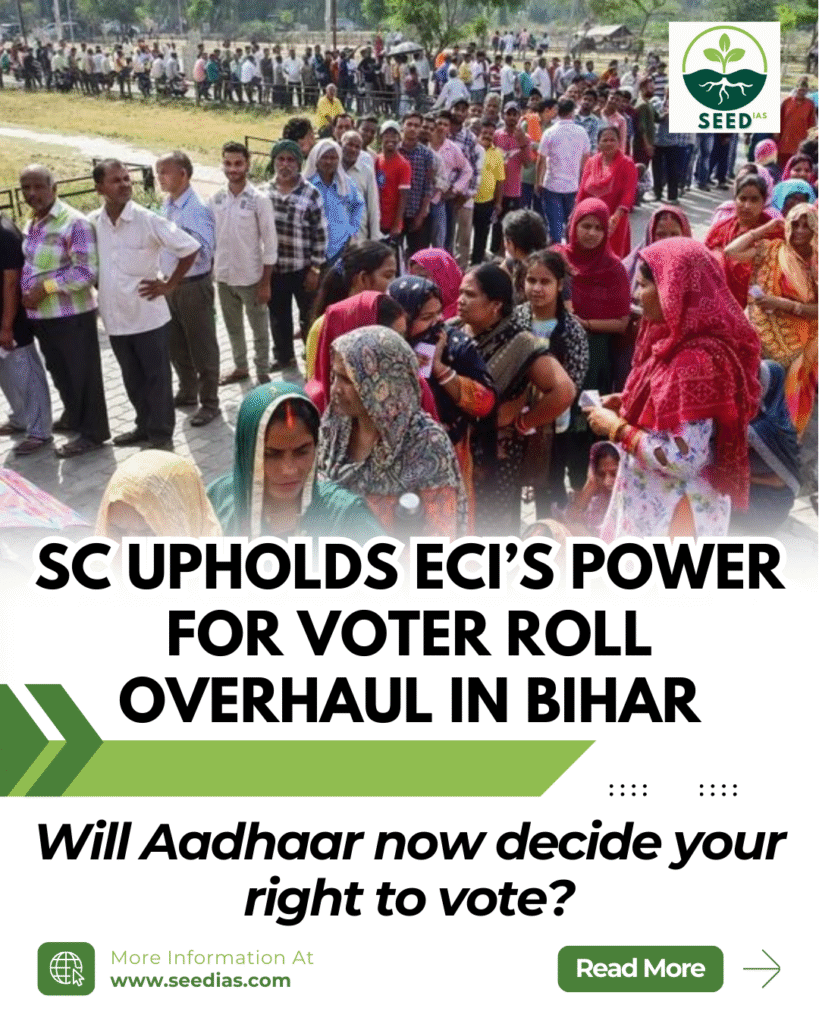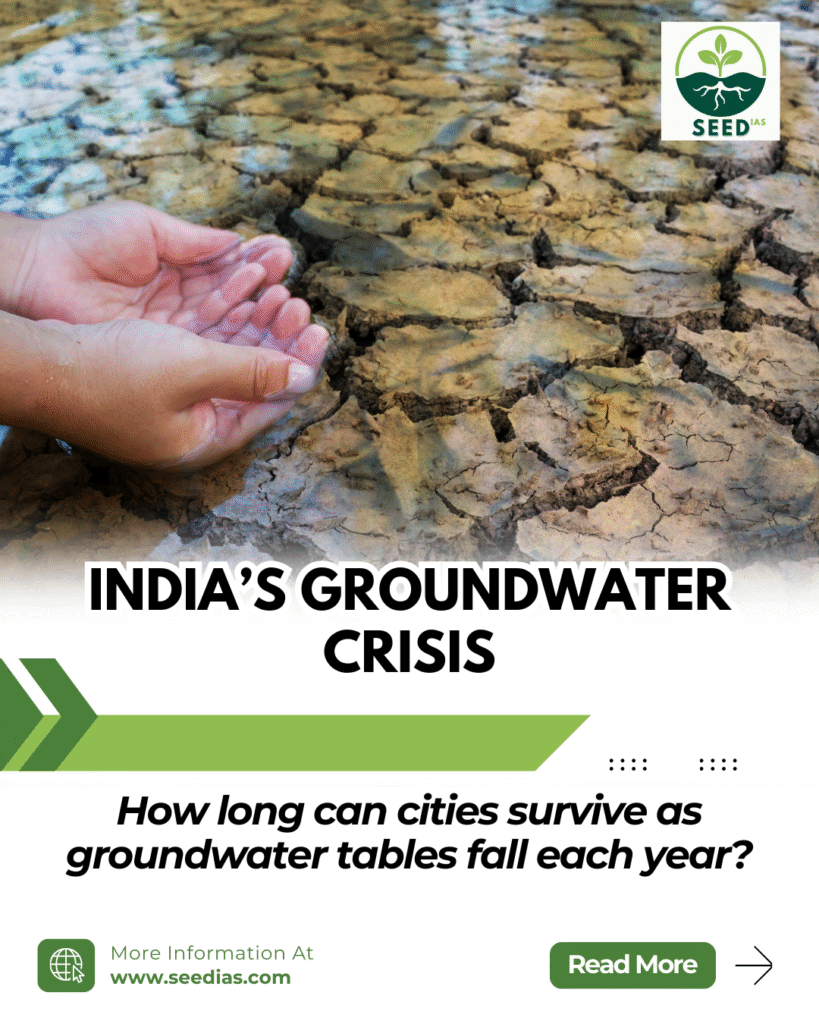Why in NEWS
The Supreme Court has upheld the Election Commission of India’s (ECI) authority to conduct Special Intensive Revision (SIR) of electoral rolls in Bihar, rejecting claims that the ECI lacked the legal mandate. The SC also recommended allowing Aadhaar, voter ID, and ration cards as valid proof for voter enumeration.
Key Terms and Concepts
| Term | Description |
|---|---|
| Electoral Roll | Official list of registered voters in a constituency, prepared under the Representation of the People Act, 1950. |
| Special Intensive Revision (SIR) | A focused, time-bound door-to-door verification process of electoral rolls conducted by BLOs. |
| Article 324 | Empowers the ECI to supervise, direct, and control elections and preparation of electoral rolls. |
| Article 326 | Guarantees universal adult suffrage for all citizens aged 18 and above. |
| Articles 327 & 328 | Empower Parliament and State Legislatures respectively to regulate elections through laws. |
News Details
- The SC has validated ECI’s legal authority for SIR as per Section 21 of the Representation of the People Act, 1950 and Article 324 of the Constitution.
- Petitioners feared exclusion of marginalized voters due to strict document requirements.
- The Court suggested using Aadhaar, voter ID, and ration cards to broaden access and avoid disenfranchisement.
- Bihar’s last SIR was in 2003; the current revision aims at updating voter lists ahead of upcoming elections.
What are Key Facts Regarding SIR
| Feature | Description |
|---|---|
| Legal Basis | Section 21 of the RP Act, 1950 allows ECI to conduct SIR at any time with valid reasons. |
| Constitutional Backing | Articles 324 and 326 ensure ECI’s powers and adult suffrage respectively. |
| Execution | Conducted by BLOs through house-to-house surveys; includes additions, deletions, corrections. |
| Past Examples | SIR conducted in 1952–56, 1957, 1961, 1965, 1983–84, 1987–89, 1992, 2003, etc. |
| Judicial Support | Mohinder Singh Gill vs CEC (1977) upheld ECI’s powers; restricted judicial review during elections (Article 329b). |
What is the Need for SIR
| Objective | Description |
|---|---|
| Accurate Voter List | Removes dead/duplicate voters, includes newly eligible citizens, corrects errors. |
| Inclusion of Migrants | Helps migrant workers, students update address and re-register. |
| Safeguard Democracy | Prevents fraud, upholds “one person, one vote.” |
| Boost Civic Participation | Promotes awareness, encourages enrollment especially among marginalized groups. |
| Tech & Policy Reform Support | Aligns with digital innovations like blockchain voting and mobile registration apps (e.g., Bihar’s E-SECBHR). |
What Concerns are Associated with SIR
| Concern | Description |
|---|---|
| Mass Disenfranchisement | Risk of excluding people due to strict or inconsistent document verification (e.g., Aadhaar rejection). |
| Migrant Exclusion | Frequent address changes make updating voter info difficult for migrant laborers and students. |
| Stealth NRC Fears | Requirements like birth certificates may act as informal citizenship tests, especially for marginalized groups. |
| Discriminatory Implementation | Fears that certain communities may be selectively excluded. |
| No Public Consultation | Top-down process without public involvement may affect illiterate or homeless individuals. |
How Can Integrity and Accuracy Be Strengthened
| Strategy | Details |
|---|---|
| Inclusive Document Policies | Accept Aadhaar, voter ID, and ration cards with legacy cross-verification for flexibility. |
| Robust Verification | BLO verification, Aadhaar-Voter linking with safeguards, ERO monitoring, regular audits. |
| Stakeholder Consultation | Engage political parties, civil society, and run awareness drives for public clarity. |
| Judicial & Legal Safeguards | Empower special tribunals and Electoral Registration Officers (EROs) with clear rules. |
| Tech Integration | AI-based anomaly detection, blockchain-enabled logs, and dashboards for transparency. |
| Inclusion of Marginalized | Conduct camps for tribals, disabled; multilingual helplines and post-revision surveys. |
In a Nutshell
Easy Recall Code: SIR-TRACK
- S – Supreme Court upholds ECI’s authority
- I – Intensive verification through BLO house visits
- R – Revision aimed at cleaning and updating voter rolls
- T – Technology use for real-time tracking and blockchain in Bihar
- R – Re-registration of migrants and address updates
- A – Aadhaar and other IDs suggested for proof
- C – Concerns over exclusion and stealth NRC flagged
- K – Key constitutional provisions: Article 324, 326, RP Act Section 21
Prelims Questions
- Which Article of the Indian Constitution empowers the Election Commission to supervise the preparation of electoral rolls and conduct of elections?
A) Article 326
B) Article 324
C) Article 327
D) Article 328 - What distinguishes the Special Intensive Revision (SIR) from regular electoral roll updates?
A) SIR is only conducted after elections
B) SIR involves house-to-house verification by BLOs
C) SIR is done by the Parliament directly
D) SIR is only for urban voters - Which of the following is NOT a concern raised regarding the Special Intensive Revision (SIR)?
A) Migrant exclusion
B) Fear of stealth NRC
C) Mass voter duplication
D) Lack of public consultation
Mains Questions
- Critically examine the challenges and opportunities associated with the Special Intensive Revision (SIR) of electoral rolls. How can this process be made more inclusive without compromising on voter roll accuracy?(10 Marks)
(GS Paper 2 – Polity & Governance) - “The integrity of democracy begins with the accuracy and inclusivity of electoral rolls.” In light of recent developments, discuss the constitutional, technological, and administrative measures needed to strengthen the electoral roll revision process.(15 Marks)
(GS Paper 2 – Constitution, Elections & Governance)
Answer Key with Explanations (for Prelims)
| Qn | Answer | Explanation |
|---|---|---|
| 1 | B | Article 324 gives the ECI constitutional authority over elections and voter list preparation. |
| 2 | B | SIR includes house-to-house verification by Booth Level Officers (BLOs), unlike general updates. |
| 3 | C | Voter duplication is not a major concern of SIR; rather, exclusion of vulnerable groups is. |














